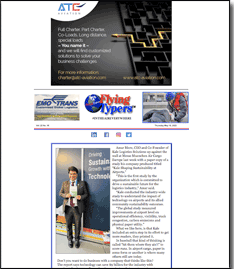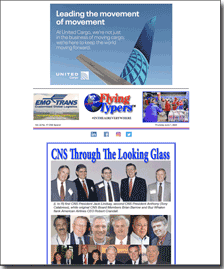 |
Several years ago, in the bar room of
a Las Vegas hotel where an air cargo industry convention was being held,
a lusty debate took on the proportions of a high-decibel shouting match.
The subject in shrill dispute: has the air cargo industry achieved a solid
state of maturity? The question rocked the barroom.
The peaked voices raged for perhaps an hour.
But then the inevitable thirst for liquid refreshment gradually, one by
one, had the effect of dampening the enthusiastic ventilation, with the
question about maturity unresolved, forgotten, left for another day.
Forgotten, but not for long. The question
vaulted back to mind when Jan Krems was appointed to the presidency of
United Airlines Cargo in 2014.
Jan Krems’ international crossover
from Air France-KLM to the highest rung on the cargo ladder at one of
the United States’ great airlines was nothing short of an act of
industry maturity—a mirror of events in a globalized marketplace.
For United’s 63-year old cargo chief,
it has been a highly spirited journey of a little more than 35 years,
taking him on a zig-zag world route to the present: Amsterdam-Manchester-Madrid-Dubai-Singapore-Amsterdam-Paris-Chicago-Atlanta-Chicago.
An airline career was the farthest from
Jan Krems’ thoughts when he earned his BA degree in economics from
Utrecht University, spent the better part of a year with the United Nations
Interim Force in Lebanon, and returned to his native Netherlands to earn
a post-graduate degree in marketing.
It was his mother (bless her heart) who
directed Jan to a newspaper ad for a management trainee program at KLM.
“There were many applicants,”
he recalled, “and it took six interviews before I was accepted as
a KLM management trainee.”
It is hardly a secret that most airline
sales/marketing applicants prefer the passenger side of the business.
Krems, however, chose cargo because of experience in the steel industry.
He has never had cause to regret his decision.
Air cargo involves the handling and movement
of all manner of boxes, bundles, crates, and containers.
Does he regard his efforts as a job or profession?
Krems came down hard on identifying it as
a profession, and to further emphasize that point, added: “I even
would say it is a way of life.” A way of life? Would he explain
this? Krems said:
“There’s a select group of individuals
who dedicated themselves to the industry, and the people you meet and
work with in air cargo also become part of your personal life . . . There
are certain people who connect with the industry and get hooked on it
for life,” Jan said.
Little could anybody have guessed or expected
just how much that single appointment of Jan Krems to the top of United
Cargo might have impacted the entire airline itself when the scourge of
COVID-19 reared its ugly presence and literally took over much of the
actions of the world a few years back.
But Jan knew his moment was at hand and
set about presenting a new deal to United for keeping the planes flying
when the passengers no longer could. He employed inventive original programs
of carrying cargo at the airline, keeping the revenue stream going.
Now it is post COVID, and we wonder what’s
next for Jan Krems?
We wonder if Jan, who is now 63, will continue
although we are reluctant to ask.
Did anybody ever ask Rembrandt if he was
going to keep painting pictures?
So we can once again relive this great story
of just what can happen when the stars line up and bring someone, an individual
of unique capability to a job of monumental importance at just the right
time as happened to Jan Krems.
Not only did he save his airline, he showed
other airlines the way.
We also can send out this update with the
man himself as Jan, out on the hustings for now, continues.
FT: What
would you like your customers and potential customers to know right now
about United Cargo's commitment to the business?
JK: United
Cargo is committed to every customer relationship we develop. We will
be working with our customers closer than ever before. We are more proactive,
very agile, we listen well, are very flexible, and humble. There is a
lot of competition out there for capacity, and we know that to make a
difference, we must work with the customer on solutions that fit their
needs.
FT: How
are you dealing with the post-pandemic situation of less cargo capacity,
higher rates, and general uncertainty in the marketplace?
JK: What
we have seen in the post-pandemic air freight business is more cargo capacity,
lower rates, and a general uncertainty in the marketplace. We must tackle
each of those challenges. We know the business and every few years we
see a challenging marketplace, so we must be flexible and operate day-to-day.
We also have to deal with the challenges
of being an airline first and dealing with our passenger capacity. We
have to balance getting the right cargo on board with the number of passengers
which is increasing each season. That's why we need to be so close to
our customers to understand what's happening day in and day out and react
to the changing marketplace.
FT: How
much impact are challenges on the ground having on United Cargo's business?
JK: Quality
is excellent for United Airlines. United has made so many improvements
for the operations and the way we do business during the pandemic, that
our challenges on the ground have not been as much of a burden on the
business as we have seen with other airlines.
FT: How
important are your partnerships, where are they really benefitting UA
Cargo, and any plans to add more?
JK: Partnerships
are important. They provide a great benefit to United Cargo and our customers.
We currently have an ideal partnership portfolio, and of course with our
joint ventures and agreement with Emirates, our network is the strongest
it has ever been.
FT: Any
new products, enhanced tools?
JK: We are
always working with our customers on our product line and enhancing our
services. We currently don’t have anything new to announce, but
we have teams working on our digital marketplace and hope to launch enhancements
to our eCommerce offerings soon.
FT: Where
have you seen growth, which global sector, where are you targeting for
the future?
JK: Where
we see the most growth is in eCommerce, the Asia Pacific region, and in
the pharmaceutical industry. We are also focused on added-value to our
customers. That can be the differentiator when it comes to our customers—we
provide a high-level of service and value.
FT: How
important are your freight forwarder partners or do you see a different
course/relationship with the traditional forwarder partner?
JK: This
is straightforward—our relationships with freight forward partners
are as important as ever. We must work closely, navigate through the changing
marketplace, and utilize our network to help customers globally.
FT: United
has always been proactive in the SAF effort. Please talk a little about
Cargo’s contribution.
JK: United
announced more investments in SAF production that any other airline. Our
Cargo customers represent the largest purchase of our 20 million gallons
of SAF in 2023. SAF is here to stay and it is important to the future
of United Cargo. Every day we are working to become 100 percent green
by 2050.
FT: Can
you say that Cargo has gained a strong voice and position in the boardroom?
JK: Cargo
has always been a very important business unit of United Airlines and
that has never changed. During COVID, we further demonstrated the importance
of Cargo to the airline. We have always been important to the boardroom,
but it truly came to light during the last few years.
FT: Address
your strengths in terms of your customers and your service. Anything else
that you might like the industry to know.
JK: I like
to say that we are proactive and humble. We offer a great product with
a commitment to quality, but without our customers, we cannot run our
business. It’s a combination of our
relationships to customers and our added-value that make a leader in the
industry.
GDA |






